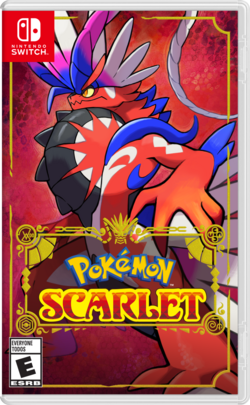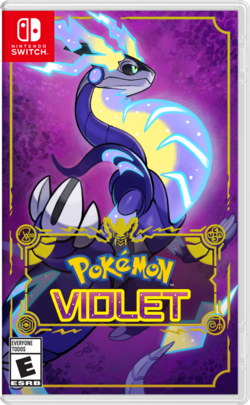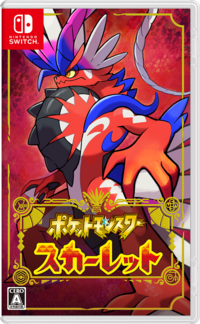Pokémon Scarlet and Violet
| Pokémon Scarlet ポケットモンスター スカーレット | |
|---|---|
 Pokémon Scarlet's boxart, featuring Koraidon | |
| Pokémon Violet ポケットモンスター バイオレット | |
 Pokémon Violet's boxart, featuring Miraidon | |
Basic info
| |
| Platform: | Nintendo Switch |
| Category: | RPG |
| Players: | 1-4 players simultaneous |
| Connectivity: | Wireless, Nintendo Switch Online |
| Developer: | Game Freak |
| Publisher: | Nintendo/The Pokémon Company |
| Part of: | Generation IX core series |
Ratings
| |
| CERO: | A |
| ESRB: | E |
| ACB: | PG |
| OFLC: | PG |
| PEGI: | 7 |
| GRAC: | ALL |
| GSRR: | 6+ |
Release dates
| |
| Japan: | November 18, 2022 |
| North America: | November 18, 2022 |
| Australia: | November 18, 2022 |
| Europe: | November 18, 2022 |
| South Korea: | November 18, 2022 |
| Hong Kong: | November 18, 2022 |
| Taiwan: | November 18, 2022 |
Websites
| |
| Japanese: | Pokémon.co.jp |
| English: | Pokémon.com |
|
Japanese boxart
| |
Pokémon Scarlet (Japanese: ポケットモンスター スカーレット Pocket Monsters Scarlet) and Pokémon Violet (Japanese: ポケットモンスター バイオレット Pocket Monsters Violet) are the primary paired versions of Generation IX. The games were released on the Nintendo Switch worldwide on November 18, 2022. All copies of the game are playable in nine languages: Japanese, English, German, Spanish, French, Italian, Korean, and Simplified and Traditional Chinese.
The game was announced worldwide on Pokémon Day on February 27, 2022, at 11 P.M. JST via Pokémon Presents.
Plot
The player character, having just moved to the Paldea region with their mother, now lives in the small settlement of Cabo Poco and prepares to start their studies at the Naranja AcademyS/Uva AcademyV in the region's biggest city, Mesagoza. The academy's director, Clavell, gives the player a choice of one of three starter Pokémon and introduces them to their next-door neighbor and the head of the academy's student council, Nemona. Despite being a Champion-level Trainer, Nemona also takes one of the starter Pokémon in her care in order to train a new team alongside the player. While exploring Poco Path, the player encounters KoraidonS/MiraidonV, which saves them from a pack of angry Houndour. An academy student named Arven identifies the Pokémon and hands its Poké Ball to the player.
As the player and Nemona make their way to Mesagoza, she introduces them to the Terastal phenomenon and arranges matters so that the player receives a Tera Orb that they can use to utilize the phenomenon as well. In Mesagoza, the player saves a girl named Penny from being harassed by members of Team Star, a group of delinquent academy students accused of bullying. They are also contacted by Professor SadaS/Professor TuroV, Arven's motherS/fatherV, who reveals that the dragon the player now travels with was originally under their possession, and asks the player to look after it.
A few days later, Director Clavell initiates the Treasure Hunt, a school project where the students of the academy journey across Paldea in order to find something that they can call their own personal treasure. This allows the player to start going through three different storylines, either simultaneously or one by one.
Victory Road
At Nemona's urging, the player sets out to challenge the eight Pokémon Gyms around Paldea. Those who collect the eight necessary Gym Badges may take on the Champion Assessment test at the Pokémon League headquarters and obtain the Champion Rank. While the player travels around the region to challenge the Gyms in any order they wish, Nemona frequently shows up to support the player in various ways, most often by battling. The player is also introduced to Geeta, the chairwoman of the Paldea Pokémon League and the region's strongest Champion-ranked Trainer, the Top Champion, as well as several members of Paldea's Elite Four.
Once the player has all eight Gym Badges, they make their way to the Pokémon League headquarters. After passing an interview test, the player battles and defeats the Elite Four and Geeta, making them a Champion. Excited of the player finally becoming her equal, Nemona challenges them to one more battle, where she holds nothing back. Defeating her in this battle concludes the Victory Road storyline.
Path of Legends
Arven tells the player about the five giant Pokémon known as Titan Pokémon that reside in various places over Paldea and requests the player's help in defeating them and collecting their Herba Mysticas, legendary herbs said to have amazing health benefits. During the quest to defeat the Titans, the player's dragon gradually regains its old abilities by eating sandwiches made with the Herba Mystica. Arven eventually also reveals that he wishes to use the Herba Mysticas to help heal his partner, Mabosstiff, who was severely injured a while back.
After all the Herba Mysticas have been collected, the player's dragon has recovered all of its former powers, excluding its ability to battle, and Arven's Mabosstiff makes a full recovery, much to Arven's immense relief. The Professor then requests the player to come see him at his laboratory at The Great Crater of Paldea, with Arven battling the player at his full power to test if they're both ready to take on the most dangerous area in the region. Defeating him concludes the Path of Legends.
★ Starfall Street ★
An individual referring to themselves as Cassiopeia hacks into the player's Rotom Phone and requests the player's help in taking down Team Star in an operation codenamed "Operation Starfall". Director Clavell, disguised as an academy student and using the pseudonym "Clive", joins the player as they make their way around Paldea to take down the five Squads of Team Star at their bases by defeating the Boss of each Squad. During the player's one-man war against the team, they gradually learn more about the team's history. The team was formed by victims of bullying who, rallied together by their mysterious "big boss", decided to finally confront their bullies. However, when confronted 18 months before the events of the game, the bullies had fled without even attempting to fight back and dropped out of the academy. Moreover, the then-deputy director of the academy wiped out all the records of bullying from the school's records, making Team Star seem like bullies themselves. Blaming themselves for having failed to prevent this from occurring, the entire staff of the academy had resigned as a result, explaining why none of the current staff members know anything about the incident.
Eventually, once all five of Team Star's Squads have been taken down, Cassiopeia reveals themselves as the "big boss" of Team Star, having started Operation Starfall because the team cannot continue operating in its current way and telling the player to come confront them at the schoolyard. At the academy, Clavell takes off his disguise and claims himself to be Cassiopeia, but after being defeated in a battle, he admits he was simply testing the player to see if they'd be ready to face the real Cassiopeia, who's revealed be Penny. After Penny has been defeated, Clavell reveals that the Team Star Bosses were watching the battle, and allows the team to continue operating, as long as they turn their bases into training facilities for Trainers, which they accept. This concludes ★ Starfall Street ★.
The Way Home
After the first three stories have been concluded, the player, Arven, Nemona, and Penny make their way to Area Zero at The Great Crater of Paldea, following the Professor's request. While the group travels to the four old research stations around the area to unlock the door to the Professor's laboratory, they encounter strange-looking primevalS/mechanicalV Pokémon, which are revealed to have been brought to the present day from another era by a time machine created by the Professor, including two specimens of KoraidonS/MiraidonV. At the laboratory's entrance, some of these Paradox Pokémon confront the player and their friends, forcing the player to enter the Zero Lab alone while their friends fight off the Pokémon outside.
Inside the laboratory, the player discovers that the Professor is actually a robot, created by the real Professor before they passed away after being attacked by one of the Paradox Pokémon. The artificial intelligence within the robot, despite being an exact copy of the Professor's memories and emotions, opposes the original Professor's plan to keep the time machine automatically bringing Pokémon from another era to the present, as it would threaten to destroy Paldea's ecosystem. However, since the AI is programmed to protect the time machine, the player is forced to battle it against its will. Once the AI has been defeated, the player is rejoined by their friends, and a program called the Paradise Protection Protocol takes over the robot Professor, as well as locking all Poké Balls not marked with the Professor's ID, leaving the player's dragon partner as the only Pokémon they can use against the Protocol's own specimen of the same dragon. Finally regaining its ability to battle, the player's dragon confronts and defeats the other member of its kind, ending the Paradise Protection Protocol's hold over the AI. The AI, however, recognizes that its systems are so integrally connected with the time machine that the machine cannot be shut down as long as it remains present. As such, the AI chooses to travel to another era using the time machine, bidding the player and their friends farewell as it disappears and the time machine permanently shuts down. Afterwards, the group decides to take a slow and scenic route back to Mesagoza, ending the main game.
Post-game
With the player and their friends returning to normal school life, Nemona suggests hosting a battle tournament at the school, requesting for Geeta to take part in it as well as the chairwoman of the academy's school board. While Geeta says she's busy with her duties as the Pokémon League chairwoman, she agrees to take part if the player takes her place at inspecting all the Gym Leaders to see if they're still worthy of keeping their positions. As such, the player returns to each Gym and takes on the eight Gym Leaders once more in a series of rematches.
After the player has finished the rematches and reported their inspection results to Geeta , the tournament, dubbed the Academy Ace Tournament, is finally conducted. The player defeats Arven in the first round, Biology teacher Jacq in the second round, Battle Studies teacher Dendra in the third round, and Geeta in the finals, officially making them the strongest Trainer at the academy. Clavell then declares that the tournament will not be a one-time event and will henceforth be held regularly, concluding the post-game story.
Features
The game is set in the Paldea region and is an open-world game in which areas are seamlessly connected. The areas in the game can be visited in any order. The game also features multiplayer with up to four players simultaneously, enabling trading and battling between players as well as allowing them to travel through the game's areas together.
Terastal phenomenon
- Main article: Terastal phenomenon
The Terastal phenomenon is a new type of transformation that allows any Pokémon from the Paldea region to power up and become bejeweled using the Tera Orb. After Terastalizing, a Pokémon's natural type attribute is either enhanced or altered according to their innate Tera Type.
Paradox Pokémon
- Main article: Paradox Pokémon
The Paradox Pokémon appear for the first time as "unidentified creatures"[1]. Great Tusk is described in the Scarlet Book appearing in Pokémon Scarlet, while Iron Treads is described in the Violet Book appearing in Pokémon Violet. They are a group of unique Pokémon that came from the ancient past in Pokémon Scarlet and the future in Pokémon Violet.
Version-exclusive Pokémon
Compatibility
Pokémon Scarlet and Violet are set to be able to connect with Pokémon HOME in spring 2023. This allows them to store and receive Pokémon from Pokémon HOME, including Pokémon from previous generations that were transferred into Pokémon HOME. However, only Pokémon that are available within Pokémon Scarlet and Violet can be transferred to them.
Reception
IGN rated the games an "Okay" 6/10,[2]. Both Pokémon Scarlet and Violet hold a rating of 76% on Metacritic,[3][4] with a much lower user score of 2.9/10 and 3.4/10 respectively.
Sales
The games sold over 10 million units in their launch weekend, which is the highest for any Nintendo game in this time frame.[5]
Version history
| Version | Release date | Game file size | Official note | More information |
|---|---|---|---|---|
| 1.0.0 | Initial release | 5.5 GB | N/A | Playable version only available via physical game cart. |
| 1.0.1 | November 10, 2022 | 6.6 GB |
|
|
Notes:
- v1.0.0 is present on the physical game carts, and is playable on a Switch whose internet connection remains off.
Gallery
Logos
Trivia
- The titles of Pokémon Scarlet and Violet are similar to several Japanese trademarks registered by Nintendo, Creatures, and Game Freak in 2008 and 2009. The Chinese titles use the same characters as two of the trademarks.
- Pocket Monsters Vermilion (Japanese: ポケットモンスター朱) [application number 2008-093273, registration number 5222908]
- Pocket Monsters Purple (Japanese: ポケットモンスター紫) [application number 2008-093274, registration number 5222909]
- Pocket Monsters Crimson (Japanese: ポケットモンスター紅) [application number 2008-093275, registration number 5222910]
- Pocket Monsters Scarlet (Japanese: ポケットモンスター緋) [application number 2008-093276, registration number 5222911]
- Pocket Monsters Vermilion (Japanese: ポケットモンスターヴァーミリオン) [application number 2009-060076, registration number 5307994]
- Pocket Monsters Purple (Japanese: ポケットモンスターパープル) [application number 2009-060077, registration number 5307995]
- Pocket Monsters Crimson (Japanese: ポケットモンスタークリムゾン) [application number 2009-060078, registration number 5341303]
- Pocket Monsters Scarlet (Japanese: ポケットモンスタースカーレット) [application number 2009-060079, registration number 5341304]
- These are the first paired core series games:
- In which the player characters' initial appearance differs depending on the version.
- In addition, these are the first core series games in which the player characters wear the same outfit regardless of gender.
- To feature version-exclusive Pokémon Professors.
- In which the game's professor is confirmed dead.
- Since Pokémon Black 2 and White 2 to be named after colors.
- In which the player characters' initial appearance differs depending on the version.
- Pokémon Scarlet and Violet are the most pre-ordered games in the series' history.[6]
In other languages
| ||||||||||||||||||||||||||||||||
References
- ↑ https://scarletviolet.pokemon.com/en-us/news/books/
- ↑ Pokémon Scarlet and Violet Review - IGN
- ↑ Pokémon Scarlet for Switch Reviews - Metacritic
- ↑ Pokémon Violet for Switch Reviews - Metacritic
- ↑ Bugs aside, Pokémon Scarlet and Violet sell 10M copies - Polygon
- ↑ https://www.oricon.co.jp/news/2257288/full/

|
This game-related article is part of Project Games, a Bulbapedia project that aims to write comprehensive articles on the Pokémon games. |
































































